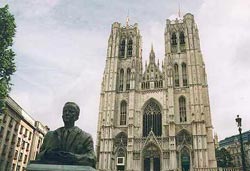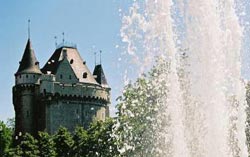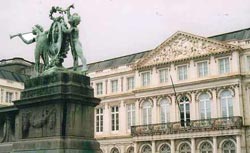 |
|
Brussels (French Bruxelles), city in central Belgium, capital and largest city of the country. Bilingual Brussels became one of Belgium's three federal regions in 1993, along with Dutch-speaking Flanders (Flemish Region) and French-speaking Wallonia. The city is located on the Senne River, and boasts tree-shaded boulevards, splendid parks, imposing monuments, and beautiful buildings. Centrally situated in northern Europe, Brussels is internationally important as the headquarters of the European Union and the North Atlantic Treaty Organization (NATO). The Church of Saints Michael and Gudule, a 13th-century Gothic edifice, is famous for its stained-glass windows. Other important ecclesiastical buildings are Nôtre Dame de Finistère and Saint Jacques sur Coudenberg. Among the notable secular buildings are the Hôtel de Ville, in the Gothic style, dating from the 15th century; the royal palace; the 18th-century Palais de la Nation; the 19th-century Palais de Justice; and the Bourse. The cultural institutions include the Free University of Brussels; the École Royale Militaire; academies of letters, fine arts, and medicine; the Royal Library; and the Royal Museum of Fine Arts.
| |
 |
The name of the city is probably derived from Broekzelle, a Dutch word meaning “village of the marsh.” The town developed from Gallic-Roman settlements in the marshes of the Senne Valley before the 7th century ad. By the 12th century, commerce and handicrafts were flourishing. Trade and industry in Brussels benefited from the promulgation of the charters of 1312 and 1356 by the dukes of Brabant. By the terms of these documents the imposition of taxes was strictly limited, and the people were given a voice in the government. In 1383 Brussels replaced Leuven as the capital of the duchy of Brabant and continued to be a seat of government during the next four centuries. Brabant was absorbed in 1430 by the duchy of Burgundy and became a possession of the Austrian Habsburgs in 1477. The city was made the capital of the Netherlands in 1530.
 |
|
The city was the center of the revolution for Belgian independence and was made the capital of the newly established kingdom of Belgium in 1831. During World War I the Germans held Brussels from August 1914 to November 1918. In World War II the city was again held by the Germans, from May 1940 to September 1944. A series of constitutional changes between 1970 and 1993 gave Belgium a federal government structure, with greater power ceded to Brussels and the other two federal regions. Population (2001, greater city) 964,405. |
The Champions' Cup will be held at the Hotel Métropole, which is a
five star luxurious hotel.
Built in 1895 the Metropole Hotel will celebrate its 110th anniversary in 2005. This only remaining hotel of the 19th century in Brussels is noticeable by the quality of its service and its internal decoration. In fact, the main entrance has been decorated in French renaissance style, the reception hall in Empire style, some rooms in Art Deco style.
In April 2002, the Council of Monuments and Sites of Region of Brussels-Capital has protected the Mιtropole Hotel's faηade as well as the ground floor.
The Metropole Hotel is marvelously well located right in the historical center of the European capital, just a few steps away from the 'Grand-Place', the 'Bourse' and the 'Theatre de la Monnaie' and close to the city's most exciting shopping thoroughfare of Brussels.
The accommodation cost is € 110 for a double room and € 90 for the sigle room per day. To make a reservation, contact:
|
|
|
• Click here for a map of the location of the hotel.
|

